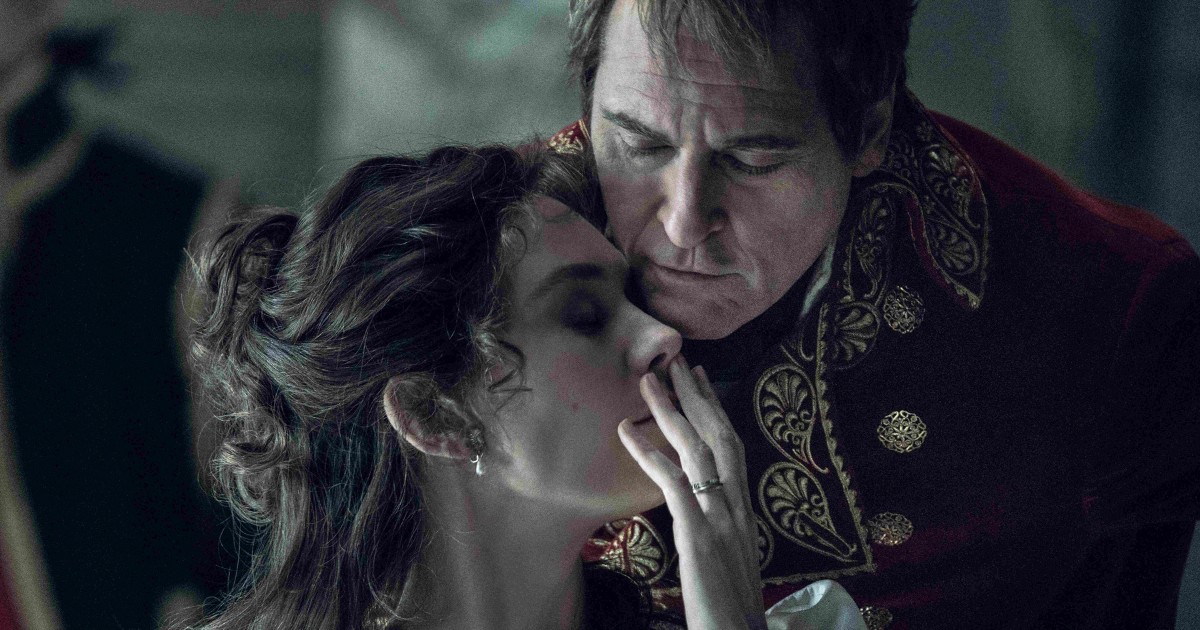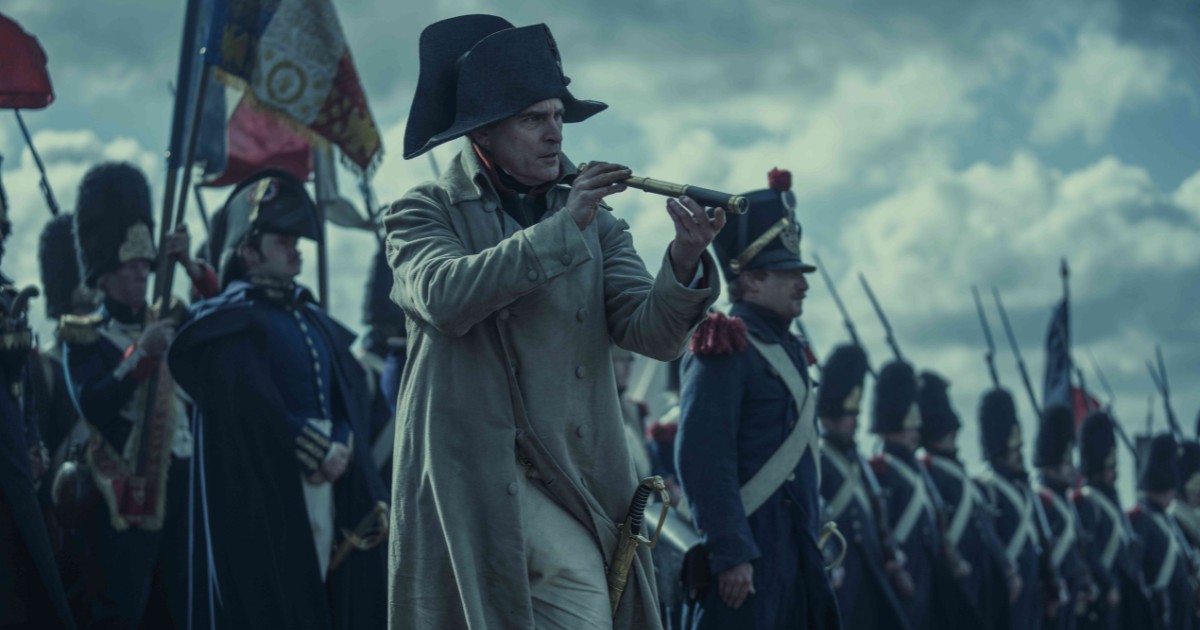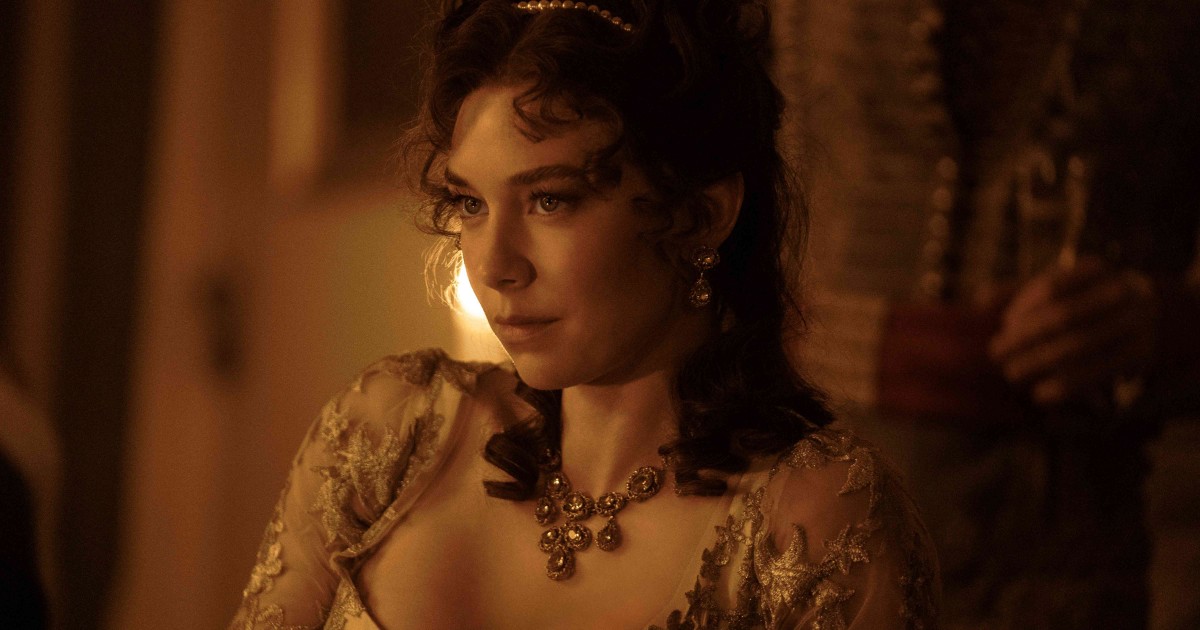REVIEW: 'Napoleon' is an epic Ridley Scott return to history as spectacle
Somewhere in the director’s storage clouds is a four-hour Napoleon cut just aching to be released. Yet at the media screening for Ridley Scott’s newest epic, the two hours and 38 minutes of the grand project felt quite compressed. It felt pretty encumbered that, despite the range of all that sweeping majesty and the intimately juvenile moments, I suspect this theatrical final cut will feel to audiences the same way.
Meaning to say, I’d love to see that four-hour cut on suspicion that it might be a more agile watch than the one I just saw, ponderous and somber as an army on the move.
It’s an ambitious film, though. Not just the subject matter but the technicalities of conveying to celluloid the warfare and life under the Napoleonic era have eluded so many directors. Even the great Stanley Kubrick’s famed Napoleon movie never saw light and went with him to the grave.
Still, Scott is from a different breed. The man’s made it his business to orchestrate the tightrope of high-budget Hollywood undertakings since he broke out in 1979’s Alien. And by high budget, we’re counting upwards of at least $100 million (over P5 billion). I mean, even his rom-coms (hello, 2006’s A Good Year) are pretty grandiose. So it feels like ever since his first move, 1977’s The Duellists about revenge-obsessed rapier men set in the Napoleonic era, came out Scott was fated to one day bring him to the completion of his passion project.
Boy, does he ever. Taking plenty of creative liberties about a shady time in French history, Scott almost never gets bogged down by the details or historical accuracies to drive his point across.

Last I heard, it gave the premier audiences in Paris fits at just how much he bent the facts for dramatic purposes. “Ridley allows himself some creative license, but it is always grounded in the truth,” said producer Kevin Walsh on the media liner notes. “We did a ton of research with historians and our writers, people that really delved into the history to make sure it was authentic.”
Our story begins at the start of the Reign of Terror in the 1790s, when Bonaparte was just an artillery commander keen to rise above his station and observant of the power vacuum the fall of the royalty has left behind—illustrated by an extended scene of Marie Antoinette marching to the guillotine and her head held aloft as a grisly trophy.
Despite its proclivity to lean into more fictional elements, Ridley Scott’s direction, from a script by David Scarpa (who also wrote Scott’s Getty thriller All the Money in the World) does indeed trace the important Wiki bullet points of the Biggest Little Man in history into explosions of spectacle.
It’s the Napoleonic wars upon a gigantic canvas that’s likely best seen on IMAX. From all the sacrificial beheadings onward, Napoleon is an old-school homage to the cinematic epic that matches a similarly epic life. Through Scott's lens, we’re a witness to how much his ambition and boldness made him rise. It’s in the battles set against sweeping landscapes, all those the rich French interiors, and period costumes that mirror his gaudy aspirations, his emotional turmoil.
Grand in scale and bloody in detail, Napoleon, under Scott’s baton and personified by lead star Joaquin Phoenix, is a silly, nerdy, petulant, and prodigious man. All five feet and six inches of him. See the emperor was, in fact, not small. Just average.

By now, Phoenix is like the poster boy for the put-upon genius. Someone like Bonaparte buckling under the weight of both social and professional persecution that he transforms himself into a beast. It’s the worst “I’ll show you!” reflex, like the Columbine kids arming themselves in to active shooters for the bullying and the awful grades. In Phoenix, you can gleam echoes of Arthur Fleck who turns into Joker, or more likely the Roman Emperor Commodus who so needed to prove his superiority that he made it a point to physically battle Maximus in Gladiator.
The reflex to overcompensation is low-hanging fruit in any biography of the emperor, yet Scott tackles it head on; like Bonaparte’s favorite gambit in any army vs army battle. Scott storyboards all of his films himself and I can see all that attention to shot detail paying off in combat highlights like at the Siege of Toulon.
It was one of the battles Bonaparte fought early on in his career when he was still but an up-and-coming thug of a Corsican artillery commander. And Scott shows us there what exactly a stray cannonball can do when one metal slug hits Bonaparte’s horse square in the chest. The white mount explodes into a fine diffusion of blood and meat, and the would-be general dusts himself off with a casual “I’m fine, I’m fine” over his underlings’ fussing. Jesus.
The peak battle scene for me was The Battle of Austerlitz, where a coalition of three nations tried to defeat the French armies. The whole sequence was just a violent and beautiful mess, like one of the scenes on Gladiator or Black Hawk Down where the fog of war veneers everything.
When Bonaparte finally crowns himself emperor in 1804, it drives home the huge irony of the moment. A contrast from when we first saw Bonaparte as an active, zealous participant in the French Revolution, aka The Terror when they gleefully sacrificed one royal head (and masses of the not-so-royals, too) after another to the guillotine in a bid to abolish the monarchy. Now, Bonaparte is royalty himself.
The other narrative vein of this movie is the love story with his wife Josephine, played by Pieces of a Woman’s Vanessa Kirby. Bonaparte falls hard and she becomes his Achilles heel. When they’re finally married he signals he wants sexy time with an absurd mumbling sound—like a needy child cajoling a sweet from a reluctant mother.

Kinky Napoleon is simply one side of the emperor that hasn’t been played up at all. Or maybe, like the sex comedy angle of the Josephine and Napoleon thread, it’s a Ridley Scott original? Scott emphasizes hard that, no matter his outsize conquests, the emperor’s relationship dynamics with Josephine are prickly and complex, at best. At worst, he’s an obsessed cuckold.
Vanessa Kirby, as much as she is on-screen, seems to always be underutilized throughout the running time and, honestly, in most of her recent Hollywood outings. Sure, on Napoleon, she preens and jockeys for position and suffers at the hands of a desperately amorous, annoying Corsican soldier who simply can’t understand why he’s not the center of her world. Why, isn’t he just the greatest?
“You would be nothing without me,” argues Napoleon, making her say it back when he finds out she’s been cheating while he’s out conquering Russia. It was news that had him abandon a hairy campaign to subdue Moscow, sailing back to France in a hurry. “I was fascinated with how a man like this—who’s on his way to take Moscow—could be obsessed with what his wife is doing back in Paris,” said Scott in interviews.
With the $200 million from Columbia Pictures and Apple Original Films, Scott’s given us a compressed picture of Napoleon’s greatest battlefield hits and a side of him that is as aggravated, petty, and wheedling (at least with Josephine) as his legend suggests. Seems worth it for me just to behold the wacky serious way the emperor gives a dressing down to a British ambassador, declaring: “You think you’re so great because you have boats!” Against France’s naval rival at the time it was a quirky, real treat.
I mean, the British would later form several coalitions with other countries just to defeat French dominance in Europe. Meaning, they had to gang up on the man to even stand a chance. As ponderously sludgy as some of the scenes are, which is why I’d like to see the four-hour cut, Scott is still firing his creatives cannons as if delivering a last sermon on the Hollywood mount.
Felt like he squeezed every last dollar from his multi-million budget to make sure a laurel was filigreed just right.
Napoleon is his own signature, unique testament to the emperor and tyrant we named after a complex, a man so voracious in ambition that we enshrined even his greatest defeat. If you’re a history buff, this is a must-watch on the biggest screen you can find.
Napoleon opens in Philippine cinemas on Nov. 29. Watch the trailer below.


